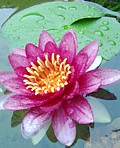|
|---|

How to sit 8What do you eat?(Adult Practice XXVIII) |
In Germany, there is a saying that you should "eat like a king in the morning, at mid-day like an emperor, and at night like a beggar". Basically, the meaning is that you should eat more at breakfast and lunch, when you still have work ahead of you, rather than after work, before you sleep. In fact the only warm meal was lunch in my family, while breakfast and dinner consisted only of bread, and I think that for many Germans lunch is the main meal, rather than dinner. In Japan, on the other hand, people seem to eat most at dinner, sometimes even nothing at all at breakfast and also not so much at lunch. Even during the sesshin at Antaiji I saw monks who wouldn't touch breakfast, saying that fasting in the morning would help them to stay concentrated during zazen. They ate a lot of fried vegetables (tempura) and noodles at lunch instead, and slept through all afternoon zazen. There must be cultural and personal differences here, but I doubt that it is so wise too eat more during the latter half of the day than in the morning, when you need energy for the tasks that lie ahead of you. In Buddhist tradition also, monks were originally not allowed to have meals after mid-day, that is why dinner is called "yakuseki" in Japanese Zen monasteries, which means "medicine stone" - i.e. it is not supposed to be a meal in the first place. And that is also why you do not find Dôgen Zenji mentioning dinner (not even "yakuseki") in the Tenzo-Kyôkun - after the cook has cleaned up after lunch, he starts with the preparations for the next day's breakfast right away. We only here Dôgen Zenji say in the Eihei-Shingi that drinking how water was possible in the shûryô - a kind of room were the monks could spend time and study outside of zazen hours. This "hot water" could have contained some rive left over from lunch, so maybe it was more like a very thin soup.
Only later this rice soup turned into thick gruel, which in turn became a proper meal. Today in most monasteries in Japan the emphasis seems to have shifted towards eating after mid-day, just as in secular society. Officially dinner is still called "yakuseki" and normally eaten in a less formal way, without sutra recitation, as it is not regarded an official meal in the first place. But often it is much more nutritious than breakfast, which envolves much ritual but may consist of nothing but a very thin rice soup and a pickled plum. Sometimes monks will start to really eat only after night sitting is over and lights are supposed to be out: In places like Eiheiji that is the time when sandwhiches with ham or tuna appear with beer to wash away the stress of a Zen monk's long day of ritual show performance in front of the tourists. For them, Buddhist practice - including the meals - is nothing but a "day time job". If on the other hand we understand practice not as a performance but as our very life, the question of what we eat becomes a vital one. Many who come to Antaiji for the first time are surprised to find that the meals are not strictly vegetarian. That includes myself - I was a vegetarian from childhood, although I ate eggs and dairy products. Maybe it was just the displeasure of chewing on bones that made me prefer a diet based on cereal, or, as my parents would put it, "it is not that this boy can't eat meat - he is just too lazy too chew it". Be that as it may, I had a quite hard time at first in Antaiji, where I found that not only were the monks not strict vegetarians, also they expected me to eat the same as everyone else, which might include fish or meat. For me it seemed to make no sense that a Buddhist monk should be forced too eat meat, while they were not used to a member of the sangha who would state his personal preferences. Anyway, I had to learn to adapt, and now I eat meat and fish whenever it appears on the table. This however only happens when someone donated such food to the temple, more than 90% of what we eat is what we grow in our own rice and vegetable fields. So the reason why we don't refuse to eat fish or meat is that we don't refuse any kind of donation, even if it is not in accord with the precepts. Interestingly, many of those who come to Antaiji and insist on not eating any meat still have no problems with drinking alcohol, or if they don't drink alcohol, they prefer Marihuana, or girls, or whatever. So often it seems to be not so much a strict adherence to the precepts that makes people become vegetarians, but just a personal idea of what you want to eat or not. At least that was the case with myself, and my practice had to do much with learning to give up these ideas, which proofed to be more difficult than sticking to a particular diet. Again, what is asked for here is the perfection of patience - or acceptance, or a "soft mind" as Dôgen calls it. That doesn't mean though that it doesn't matter at all what we eat. I wouldn't go quite as far as saying that "you are what you eat", but what you eat certainly determines a good part of what you are. You can easily verify that if you sit in zazen after eating very spicy food one day, and then after eating sweet stuff the next day. Your zazen won't be the same, because you won't be the same. So if we accept all of what appears on the table as part of our meal, then that means that the tenzo (cook) has to think well about what he wants to put on the table in the first place. In the Hôkyôki, a first hand record of Dôgen Zenji's experiences in Sung China, we hear Nyojô Zenji warn against consuming "the five spices, meat, too much honey or milk, alcohol, impure food, raw and hard (un-cooked) food, mountain tea that has gone too old, medicine against colds, mushrooms, dairy products, too much dried plums or chestnuts, too much fine and raw sugar" and may other things. As I said, even fish and meat are sometimes donated to Antaiji, but they are considered a rarety and for those who like to eat fish and meat therefore represent a special treat. That is why the tenzo might sometimes store fish and meat away for use during sesshin, when people have to put up with so much pain that they appreciate a delicious meal all the more. Still, I don't think that it is wise when fish and meat appear everyday during sesshin, because it will make zazen harder than it already is, and the same is true for onion and garlic which can enhance delusive thoughts and are therefore not part of the traditional Buddhist diet (but appear from time to time at the table in Antaiji). On the other hand, I also don't see the point of eating according to a strict Buddhist diet during sesshins only and then indulging again right after sesshin, because the days outside sesshin are just as much part of our practice as are the sesshin. Food always counts. What also counts is the work we do and the fatigue we experience, a problem which I will return to next month: Why are we so tired!?
to be continued ... (Docho)
|
|---|
 |
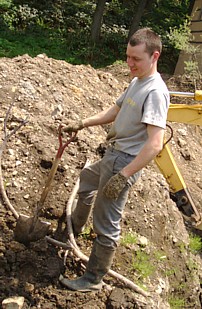 |
Dear Muho,
Wie gehst? Ich kann jetzt nur ein bisschen Deutsch sprechen! It's strange the way that Life takes you and gives you what you need, when you need it, despite the likes and dislikes, plans and intentions of your ego. I find myself in Berlin, searching for an apartment in Prenzlauerberg, learning Deutsch and looking for a job! A lot has happened since I left Australia about a year ago, and Antaiji about 2 years ago. I have travelled all over Thailand and India, practised yoga for months, studied at a Tantric yoga school, and found a wonderful girlfriend. We travelled together out of backpacks for 13 months until finally now, we have a more permanent roof over our heads. I have learnt a lot about integrating spiritual practice into one's daily life by being in a relationship with a woman. There is too much fear among men that women are a distraction from their real work, their spirituality. I am still dealing with this issue. Women are half the world, and unless we get in touch with that, we're not going to be complete. This doesn't necessarily mean getting married or having a girlfriend, but to run away from it, or think of women as the philosophical 'other', is just another separation. Men have a lot to learn from women just as women have a lot to learn from men. I have learnt a lot about conscious relationships, where both partners support each other in their spirituality and evolution, with patience and respect. After a while you can judge when a person is in the grip of a negative thought-pattern or behaviour, and is not being their true infinite self. The trick here is to remain centred and conscious, thereby helping them to return to who they really are. Unfortunately in most cases, it is easy to get tricked into retaliating, fighting back, and jumping into a downward spiral of anger, fear or aggression. I have no real intentions of returning to Japan, but I would love to hear from you - maybe you are even coming to Berlin sometime? What part of Berlin did you grow in? By the way, do you have any suggestions about living in Berlin, finding jobs, finding a meditation community, or anything else of interest to me as a foreigner, trying to start up a life here? Blessings to Tomomi and Megumi. Your daughter is very cute, and resembles Tomomi a lot! You must be a proud father. Regards,
(Joel)
|
|---|
 |
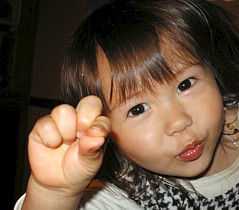 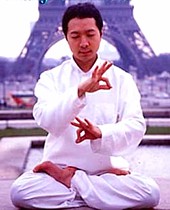 What happened to "our problem"? (Part 5) |
The problem posed by the Sarin attack of the Aum cult in the Tokyo subway was defined by the officials of the Rinzai and Ôbaku sects as a
"question of responsibility of the Zen sect as an established religion in modern society". So what answer do they give to their own question? "The religious establishment is dwelling savely in their temples, relying on the support of their parishioners, without taking notice of the corrison right below their feet. Nor do they pay any interest in the direction that modern society is historically developing, and that is why they are completely unable to respond neither as individual priest nor as religious organizations as a whole to the questions asked by modern man. As a result, the Buddhist temples have turned into mere ceremonial halls for funeral services, and the Zen sect has turned into an obscure historical relic of old times, with no relation to present day society. We have to reflect on this tendency, keeping in mind our own responsibilities as Zen monks and temple priests. We have to think once more about the style of our practice, handed down in the tradition, present day activities to spread the dharma, and the real situation in the single temples and the Zen organization as a whole." This is a pretty severe self-criticism from the side of the Zen officials. But how are they going to bridge the gap between tradition and present day responsibilty, between the buddha dharma and the rotten reality in the temples? "We discussed the topic what we as Zen Buddhists could do for those young believers who were lead around a leash by the Aum cult, and are spiritually lost now. But, regarding the strong criticism and fear of the cult in Japanese society on the one hand, and the fact that the single temples all rely solely on the support of the parishioners, without the priest feeling any sense of responsibilty for society as a whole, and also the structure and atmosphere in the religious establishment today, it seems to be quite unrealistic if we - representing the Rinzai and Ôbaku sects - would pronounce that the former Aum believers should be accepted and given asylum. We have come to the conclusion that this would be impossible considering the real state of our sect now. It seems to us that the fact that each of us as Zen monks feels that we have to do something about this problem, while at the same time realizing that we are unable to take any real action - not only as individuals but also as a religious organization - is the reason why the 'Aum problem' is also 'our problem'. Being aware of this, we agreed that we have to make an effort and find a way out of the dilemma we are stuck in." The officials discussed, analyzed, felt responsible and concerned, realized a dilemma and came to the cocclusion that more effort is needed. A lot of words, no action... "We want to end our report with the following proposal: We suggest that the Rinzai and Ôbaku together build up a new institution with the purpose of looking for answers for the basic problems throughout both sects, i.e. the lack of dharma heirs and proper training, the problems posed by the wifes of the Zen priests or the question how to propagate the dharma in modern society. Such an institution might help to bring some reform inside the organization. We are aware that this proposal might not sound like a direct solution to the problem at hand. But reflecting on the challenge that we are facing, and our own present situation, we hope that the respective responsible persons approve of our suggestion. Not only modern society is suffering from a basic problem, we ourselves are suffering from the same disease." This is how the report of the symposium about the "Aum problem" that continued for 6 months ends. Indeed, building up a new institution which is to be responsible in turn for all those questions that the symposium couldn't solve doesn't quite sound like an answer to anything. If the officials are really aware that the real problem is our present situation, i.e. "our problem", why wait for a new institution to solve those problems which can't be solved by anyone one but ourselves, here and now? What are these problems? More basic than the "Aum problem" are indeed those named in the report: The lack of dharma heirs (i.e. the sons of the priest refuse to become monks themselves), no training, temples turned into family homes, the absence of dharma. How could we expect the Zen priests to offer help to modern society when they can't even take care of their private lifes? Many in the West might not be aware how life in an average Japanese Zen temple really looks like. Let's take a look next month.
to be continued ... (Muho)
|
|---|
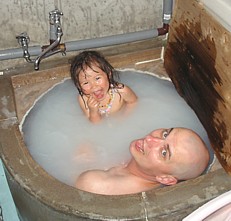 Fighting hard for spiritual liberation in boiling water |
